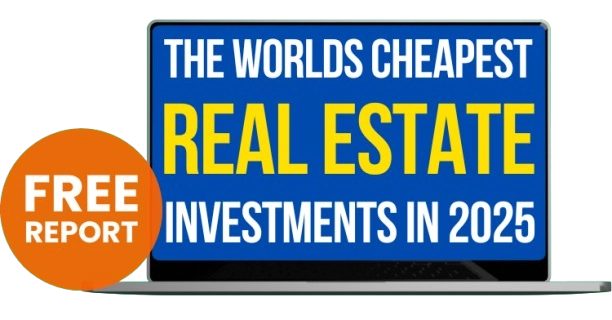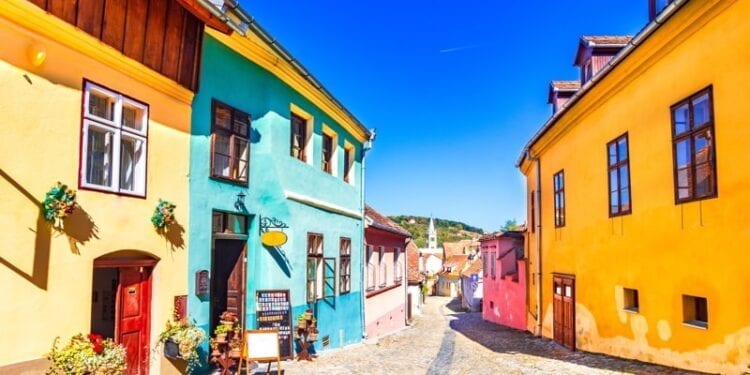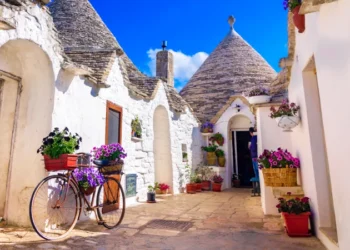There are two reasons to purchase real estate overseas…
First, because you have moved there and you decide you want to own. You want to nest. You want a place you can decorate and furnish as you like, where you can make a garden, install a swimming pool, store your keepsakes…
The second reason to purchase a piece of real estate in another country is because you have reason to believe that investment will make you money.
These are two very different agendas—buying for personal use and buying for profit or yield.
The best case is when they coincide, when you find a piece of real estate in the place where you want to spend time that also holds out the potential for an investment return (in the form of capital appreciation and/or a yield from rental).
But if you’re buying straight-up for profit, every decision is based on the numbers.
And if you’re buying for personal use, even just part-time personal use, you want to make your choices based on many things, including some that can’t be quantified in a spreadsheet.
Consider the following fundamentals of real estate acquisition, which I’ve organized according to the two agendas at work here…
First, considerations related to a personal-use agenda:
– How Much Space Do You Need?
Do you want an apartment or a house? One bedroom or two? A back garden and a swimming pool? A guest room or even a guest house? If you intend to let the place out when you’re not in residence, balance your personal space requirements against what kind of property rents best on the local market.
– Where Do You Want To Be?
In the heart of downtown… or out in the country? On the coast or overlooking a river? In a gated community, a local neighborhood, or off on your own with undeveloped acres between you and your nearest neighbor? Consider climate, traffic patterns, transportation (where you settle determines whether you’ll need to invest in a car, for example), the convenience factor, and nearby amenities (shopping, restaurants, nightlife, parking, etc.). Again, if you intend to rent the place out part of the year, balance your own location preferences with an understanding of which regions or neighborhoods are most sought-after by renters.
Start Your New Life Today, Overseas
– Furnished Or Unfurnished?
If you buy unfurnished (which you’re typically going to do, unless, say, you buy from another expat who’s interested in selling his place including all contents), where and how will your source furniture?
– What’s Your Budget?
Everything follows from this. Be clear on it before you start shopping.
Now, considerations related to the investment (profit) agenda:
– The Path Of Progress
This is a key factor when buying for investment but important if you’re buying a retirement or second home abroad, as well. What infrastructure improvements are planned? A new airport, new train station, new highway, new hospital, etc., can mean a new universe of potential buyers… which is good news if you’re buying as an investor looking to develop or to flip. These things, though, also translate to better living.
– Inventory Supply And Demand
In Panama City back in 2010 or so, for example, a glut of high-rise condos began coming online. These units were launched and sold pre-construction over the preceding half-dozen years. Once they were being delivered, their volume was one reason Panama’s capital market softened.
– Costs Of Acquisition
Remember that they go beyond agent commissions. Depending on the market, they can also include: legal fees, notary fees, registration fees, title insurance (if you can get it—it’s almost entirely unavailable outside the United States), and transfer taxes (sometimes called stamp duty). In Ireland, for example, stamp duty can be as much as 9% of the purchase price. This point is important whether you’re buying for personal use or for investment, of course, but it becomes important in a different way in the context of making an investment. In this case, you want to be sure to factor in all costs of acquisition so as to have a realistic expectation of return.
– Carrying Costs
Including: maintenance (a house on the beach requires a lot of it, for example); a caretaker (if you won’t be in residence full-time yourself); property taxes (not every country charges them, and, in some countries, they’re negligible); income taxes (if you’ll be earning rental income); capital gains taxes (when you eventually resell… again, not every country charges them); other local taxes; property management expense (you’ll need a property manager if you intend to rent); rental management expense (separate from property management and, again, necessary unless you’re going to manage all the details of your rental investment yourself… something I don’t advise); and homeowner’s association/building/condo fees.
– Economic Outlook
Critical if you’re buying for investment, but you don’t want to ignore the market climate even if you’re buying purely for personal use. Markets move up and down… and then up again. At what point in this cycle is the market where you’re thinking about buying right now? In which direction is it moving?
– Opportunity For Diversification
In terms of market, type of investment, type of property, and currency.
Start Your New Life Today, Overseas
What To Ask Before You Buy
- What is the drive time from the nearest airport?
- What is your access and right-of-way? That is, how do you get to your house or property? Must you cross another person’s property? If so, are you certain your neighbor can’t ever restrict your access?
- Is the property accessible year-round, including during winter and/or in the rainy season? Not all roads are accessible year around in a given region depending on the season. Does it snow heavily? Will ice block your path for weeks a year? In the tropics, streams that barely flow or don’t at all during the dry season can be raging torrents when the annual rains start. Ask about the road condition in all seasons.
- How far away is the nearest medical care facility? How far is the nearest hospital?
- Is there enough water and water pressure? Is there hot water? Check beneath the sinks (in every bathroom) to see if the plumbing provides for both hot and cold water… don’t take for granted that a blue handle and a red handle actually indicate the temperature of their waters—both might be fed from the same cold-water line.
- What distance are you from day-to-day services (grocery stores, dry cleaners, pharmacies, banks, etc.)? Consider this (and proximity to medical care facilities) in terms of time rather than distance. Ten miles on a rough dirt road in the rainy season can translate to an hour or more of travel time.
- Will you need a car living in this place? Does your budget allow for a car? Where will you park?
- What’s included with the property? In many countries when you buy a home, you buy bare, stripped walls and empty rooms—no lighting fixtures, no appliances.
Sincerely,

Kathleen Peddicord
Founding Publisher, Overseas Opportunity Letter

















